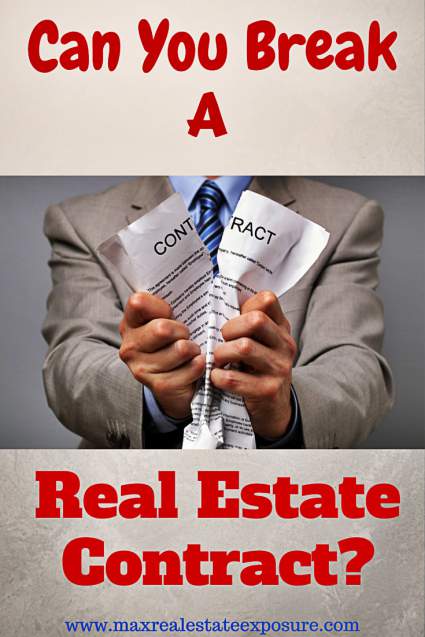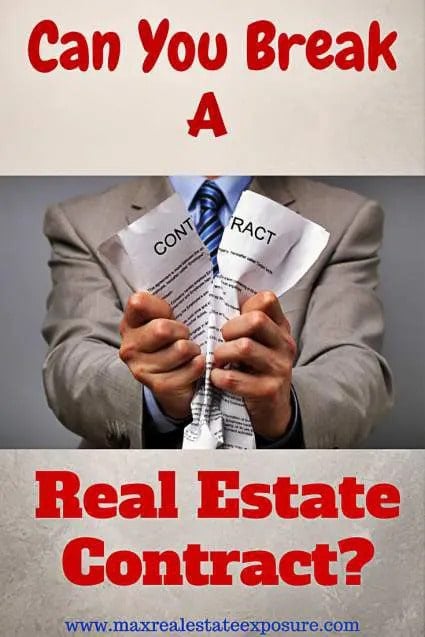Can a Buyer or Seller Break A Real Estate Contract?
 Can a seller back out of a contract? How about a buyer? Trying to back out of an offer is not all that uncommon.
Can a seller back out of a contract? How about a buyer? Trying to back out of an offer is not all that uncommon.
Once you have been in the real estate business long enough, you can be assured you are bound to hear the question, “can I get out of my real estate contract”? Buyers’ and sellers’ remorse happen all the time in our business.
It is not uncommon for a buyer or seller to ask if they can back out of an accepted offer.
When you sign a real estate contract as either a buyer or a seller, you have committed yourself to a legally binding agreement.
Ideally, you would meet all the contract terms and conduct the transaction as planned.
But in real life, unexpected things happen, and the agreement you were so happy with at the beginning may start to seem like a ball and chain that you want to be removed at any cost.
Fortunately, it is possible to break your contract but certainly not easy. You have to be prepared to deal with the consequences, whatever those happen to be.
In Massachusetts, breaking a real estate contract is not so simple, and there are almost always complications involved with doing so.
The ramifications could depend on which type of real estate contract you are breaking. When people ask, “can I cancel my real estate contract” you need to know exactly what kind of contract.
Understanding The Two Types Of Massachusetts Real Estate Contracts
The state of Massachusetts has you signing two contracts while purchasing a real estate property.
While the contracts are similar, they come in various stages and commit you to somewhat different obligations. The contracts are known as the offer to purchase contract and the purchase and sale agreement.
When you sign the offer to purchase, you are committing to all the principal terms of the real estate transaction, including how much you’re going to pay for the property, how much you will be putting in escrow, the amount you’re financing, and the date by which you will procure such financing.
Real Estate Contracts Typically Have Contingencies
There will also be an agreed-upon closing date and any other real estate contingencies you or the seller may need.
These contingencies are acceptable reasons you would not fulfill your home purchase, such as if you cannot get a loan or if the home inspection comes back with major issues – mold, lead paint, radon, well water problems, pest issues, etc.
With the offer to purchase contract, you will probably be handing over between $500 and $1,000 of earnest money that you may be at risk of losing if you back out of the contract without a valid reason – such as your contingencies.
The purchase and sale agreement is a more detailed version of your offer to purchase contract. It will usually have the same information on it as far as contingencies if they have not been completed and the acquisition’s ground rules.
However, it will also require you to put money in escrow to back up your offer before closing, often around 5% of the purchase price.
After you have put the money in escrow, breaking the real estate contract means you may lose that money, which can be a sizable amount depending on the price of the home. This is why it only makes sense to attempt to cancel the contract if you have justification. At least if you don’t want to lose your money by doing so.
Can a Buyer Cancel a Contract Before Closing?
 Sellers often ask real Estate agents can a buyer cancel a real estate contract before closing.
Sellers often ask real Estate agents can a buyer cancel a real estate contract before closing.
Since the buyer is the one forking over the money for the home purchase, it only makes sense that it would be the buyer that most often gets cold feet.
Customers tend to break contracts more often than sellers for many different reasons. Some of the common reasons why a buyer may cancel a contract include the following below.
These are all valid reasons to back out of buying a house.
General Home Inspection Issues
General home inspection issues – many issues could arise during a home inspection. Some of them will be large, and others will be small.
Everyone has a different perspective and tolerance on what they consider a problem.
Mold Can Present Problems
Mold – this is one of the bigger issues in real estate at the moment. Everyone is afraid of the health risks of having mold on a property.
It is something that all homeowners should be cognizant of, especially when they are selling a home. You can expect that a buyer will want mold remediation to be taken care of as a condition for purchasing the home.
High Radon Levels Can Be Problematic
Radon – Radon is another issue that home sellers should be aware of. Most buyers are not tolerant of having radon and will want the issue to be remedied by the seller.
An even bigger complication is when radon is discovered in the home’s water supply. While removing radon from water can be done fairly quickly, it can be expensive. You can expect to pay somewhere between $4000-$6000 for remediation.
Foundation Issues Can Be Significant
- Foundation issues – Problems with a foundation are usually not something you take lightly when they are structural in nature. Structural can be costly to repair. They also give buyers tremendous fear about the integrity of the property.
Replacing a Roof Can Be Costly
Roofing issues – The roof is a major component in a home, and most buyers expect that it will be free of water penetration at the very minimum.
Roofs can also need repair or replacement before their life expectancy is up. This is where a qualified home inspector comes in handy to determine when the roof will need replacement.
HVAC Issues Shouldn’t Be Taken Lightly
HVAC, Plumbing, and Electrical problems – given these are critical components in the house and cost much to fix if their significant issues, a buyer could choose to pass on buying the home when there is no cooperation from a seller.
Contingencies Allow A Buyer to Escape
If you are the buyer and find out that something is wrong with the home, you will most likely need to fix it later at your expense – understandably, you would hesitate to make the purchase.
Fortunately, your contract will likely have some contingencies that will allow you to back out of the acquisition without losing anything, as long as the reason is based on one of the contingencies.
For example, if the house has a severe mold problem and your contract has a home inspection contingency, you can quickly end the purchase.
This is why we stress to home sellers the importance of getting ready for the buyer’s home inspection. If more sellers just took the time to inspect the inside and outside of their homes, looking for problems, it would prevent many sales from falling apart.
Should a Buyer Cancel The Contract?
You may wind up in a situation where you must cancel the contract for reasons not listed in the contract. If you find yourself in this dilemma, you must consider whether it is worth ending the contract.
You will lose money and may risk being sued by the seller for damages, although this does not happen often.
Generally speaking, the standard purchase and sale will often include language that says forfeiture of the deposit shall be the seller’s sole and exclusive remedy at law and in equity.
In other words, the seller cannot sue the buyer for damages stemming from not proceeding with the sale. Keeping the buyer’s earnest money deposit would be the only means of compensation.
Can a Seller Back Out of a Contract?

Every now and then, I will get a seller who asks me if they can back out of the contract with the buyer. Many folks will ask specifically if a seller can back out after an offer.
Although it is less common, there are times when a seller wishes to terminate a real estate contract. Backing out of an accepted offer is not easy.
A seller backing out of a contract before closing is far more problematic.
If you find yourself in this situation, you should also be aware that the agreement you signed is legally binding on your end.
As a seller, you could run into financial and legal troubles if you back out. It’s possible you could even wind up being forced to sell your home if the buyer sues you for performance.
If you want to break the contract as a seller, the first step is to discuss the situation with your real estate agent.
Your Realtor can help you understand your options and may be able to smooth the way for breaking the contract. You must be ready to give the buyer back the escrow money.
In your negotiations with the buyer, you may also be forced to concede some other things, including expenses incurred by the buyer, like home inspection costs, attorney expenses, etc.
You may also have to pay for interim housing if the buyer has already sold his or her home in expectation of moving into yours.
This is a universal concurrence in real estate when someone buys and sells a property simultaneously. Just put yourself in the buyer’s shoes for a moment if they have closed on or will be on their current home and have nowhere to go.
Another possible complication is if the interest rate had gone up from when they locked their rate to when you asked out. You may also have to buy down their mortgage rate if this happens.
Suing The Seller For Backing Out
If you’re buying a house, you may wonder what to do if a seller backs out of a contract. Suing a seller for backing out is certainly an option if you cannot reach an equitable agreement.
There are always costs associated with breaking business agreements, and a real estate deal is no exception. Whether you are buying or selling, you should be aware of these costs before you sign and certainly before you attempt to break the contract.
Some sellers don’t understand the legality of what they are signing. Most contracts are legal and binding. While getting cold feet as a seller could be devastating, you can’t just expect that a buyer who has committed to buying your home will just roll over and say OK, no problem. Life is usually not that easy.
Without a doubt, if you find yourself in a position where you no longer want to sell your home be prepared to beg for mercy from the buyer. They do not have to let you out of the contract. Sellers cannot back out of a sale just because they want to. I repeat, a buyer is under no obligation to free you from the sale!
A buyer suing you for performance will more than likely win. A seller will win very few cases if the buyer has met all of their legal obligations in the agreement.
So a seller cannot back out of an accepted offer without legal consequences if the buyer chooses to pursue their legal rights.
Suing a seller for a breach of a contract is common in real estate sales.
Reasons Why a Seller May Want to Back Out of a Contract
When it comes to whether a seller can back out of a real estate contract, there are usually some common reasons they want to do so. Here are the most common:
Seller Receives A Better Offer From Another Buyer
The seller received a higher offer after they signed a contract. Legally, a seller cannot back out of a contract because they have received a better offer after executing an agreement.
It becomes really tricky for a seller when they receive a backup offer they know is higher than the agreed-upon contract. Sellers need to be careful not to disrupt a contract intentionally.
The Seller’s Plans Have Changed Unexpectedly
The plans of the seller have changed. Maybe a relocation was planned due to a job, and that is no longer happening.
Seller’s Remorse is Possible
Sellers remorse. Sometimes, a seller gets remorseful about their decision, just like a buyer. Selling a home can create emotions for the property you live in. It’s not uncommon not to want to leave.
A Suitable Home Could Not Be Found
The sellers could not find a house to buy. One of the conundrums of buying and selling a home at the same time is being able to locate a house to move to. Sometimes inventory is scarce, which makes finding another home very challenging.
Estate Sale Troubles
Disagreements with family members or an estate sale. It is not common for family members to be on the same page. It is easy to have a spouse not want to sell. When selling an estate home, it is also possible for one of the family members to hold on.
Death or Divorce Complicates The Sale
A death in the family or divorce. Not many things in life can create more havoc than death or divorce. It can cause family dynamics to change in an instant.
What Happens if The Seller Backs Out of The Contract?
Several things can happen if a seller illegally tries to terminate an agreement. Some of them are the following:
- The buyer can force the sale via specific performance, a fancy legal term meaning sue, to make the sale happen.
- The real estate agents could sue for their commission.
- The buyer could put a lien on the property, making it impossible for the seller to sell to someone else later.
So a seller can try like heck to back out before closing, but there will likely be some unsettling consequences.
Breaking a Contract With Your Real Estate Agent
So now you know some of the most essential things buyers and sellers should know about terminating real estate contracts. What about backing out of a contract with a real estate agent?
 One of the things I get asked quite often is how I can fire my real estate agent. As a matter of fact, a seller looking to break a contract with a real estate agent is probably far more likely than the above scenarios.
One of the things I get asked quite often is how I can fire my real estate agent. As a matter of fact, a seller looking to break a contract with a real estate agent is probably far more likely than the above scenarios.
Like anything else, Realtors and home sellers often sign a contract that spells out an agreement between the parties.
It will likely be an exclusive right-to-sell real estate listing contract.
The contract terms usually include the parties’ names, including the real estate company, the home’s asking price, the commission due to the real estate company or companies, and the length of the contract lasts.
Often, homeowners get into trouble because they do not do proper research on the agent they have decided to hire.
After a few months of working with the agent, they may conclude they have made a terrible mistake.
There are many reasons why this can happen, and it is usually performance-based.
Some of the greatest complaints against Real Estate agents are the following:
No Communication
A lack of regular communication can cause issues. Clients deserve to know what is going on with their home sales. Many real estate agents are very lax about regular communication. This can become a big problem for a home seller who wants to be informed, and rightfully so.
Misrepresenting The Home’s Market Value
The willful misrepresentation of the market value of the home is common. Believe it or not, numerous real estate agents inflate values to obtain a listing.
It is human nature for all of us to believe our homes are worth more than what the neighbors just got. Unscrupulous Realtors know this and use this as a strategy for obtaining the listing.
Of course, this is also a mistake on the seller’s part if they are naive enough to believe it. Real Estate data never lies – people do!
Lousy Real Estate Marketing
Lack of marketing, including the internet, quality photography, and proper quality brochures, are all possible. Some real estate agents will try to get away with doing the bare minimum.
I refer to these agents as “post and pray.” They put a sign in the yard, put it in the multiple listing service (MLS), and pray. This is not the kind of agent you want! You might as well have gone with flat fee MLS with an agent like that.
There are many other reasons you may want to fire your real estate agent besides these three most common ones. Again, like any other agreement, you need to figure out the ramifications of doing so.
I discuss this at length in the comprehensive article above about firing a Realtor. Take a look and read it, as you will see the best way possible how to get out of a contract you no longer want to be in.
Remember that breaking a real estate contract is a big legal step. You should always consult an attorney before attempting to do so. Good legal advice is always a prudent move, especially when dealing with a lot of money.
Final Thoughts on Terminating a Real Estate Contract
Whether you are a buyer or a seller terminating a real estate contract will have consequences for both parties. If you sell a home and try to break the agreement, you could be sued for performance. If you are a buyer trying to break a contract, you could lose all of your earnest money.
The consequences of breaking a contract can be different from transaction to transacGettingetting out of a real estate agreement is not a pleasant experience. It is highly advisable to hire a real estate attorney to assist you when trying to back out of a contract. Without legal counsel, you could dig deeper and create more problems for yourself.
Hopefully, you have enjoyed this guide on backing out of a contract.
Additional Helpful Articles on Real Estate Contracts
- Enforcing real estate contracts – see what you need to know about real estate contract enforcement with the tips provided via Lawyers.com.
- What is specific performance in a real estate contract? Learn what the legal term specific performance means when it comes to contract law.
Use these additional articles to decide whether or not breaking a real estate contract is a wise decision. Canceling a real estate contract can come with consequences you may not be prepared for.
About the Author: The above Real Estate information on buyers or sellers backing out of a real estate contract was provided by Bill Gassett, a Nationally recognized leader in his field. Bill can be reached via email at billgassett@remaxexec.com or by phone at 508-625-0191. Bill has helped people move in and out of many Metrowest towns for the last 36+ Years.
Thinking of selling your home? I am passionate about real estate and love sharing my marketing expertise!
I service Real Estate Sales in the following Metrowest MA towns: Ashland, Bellingham, Douglas, Framingham, Franklin, Grafton, Holliston, Hopkinton, Hopedale, Medway, Mendon, Milford, Millbury, Millville, Northborough, Northbridge, Shrewsbury, Southborough, Sutton, Wayland, Westborough, Whitinsville, Worcester, Upton, and Uxbridge MA.


An interesting twist on all of this is the seller breaking the contract by letting the buyer fall out of contract. As Colorado’s home market has exploded from one spectrum – Buyer’s Market – to the other, Seller’s, it isn’t uncommon for the seller to have a better offer come along. We’ve seen this happen around inspection objection deadlines. The buyer asks for a pile of things to be done. The seller doesn’t respond. The contract terminates on a technicality and the buyer is suddenly out of contract.
I have seen this situation play out as well but you need to be very careful. From what I have read in a few court cases if the parties continue having a dialog it can be assumed that the contract is still in force.
I understand that from state to state we operate under differing sets of state and local rules. I read about letting “the clock run out” and many issues come to mind as a broker. It seems that this sets up a possible liability for the brokers involved and the parties themselves.
Having read through many court cases and getting them monthly through my E&O newsletter it is not hard to visualize one of these cases making it to litigation. Contract law is not just about the four corners of the contract. Judges look at intent and good faith or intent as well.
Seller sits and the buyer loses their favorite home and it does not take long to see the possibilities. I guess everyone prays the release from contract gets signed by all parties.
I wonder how many sellers do not do complete a new disclosure to include the home inspection items.
I totally agree with you John. I made this same comment to someone else who suggested you could just move on from buyer #1 one from just waiting them out. Not so fast. I know court cases have been tried and the seller has lost when trying to break a contract with the first buyer by just intentionally letting the contract expire past agreed upon signing dates.
The whole premise of this story is incorrect. Getting out of the contract on the contingencies is not breaking the contract. Breaking the contract means backing out even AFTER the contingencies are removed. In a case like this, the author suggests that the client talk to his or her Realtor. Wrong! No real estate licensee can advise them to break a contract. In Virginia, that’s UPL. When somebody comes to me with something like that, my advice is very simple: consult your attorney.
Mark I suggest you read the article again instead of just skimming it. The term “breaking a real estate contract” in this context is the same thing as terminating or ending an agreement. The contingencies allow you to terminate or break a contract without consequences which is exactly what the article states.
You should also re-read what I wrote about informing your Realtor. What I said is if you want to terminate your real estate contract you should let your agent know. No where here does it suggest your Realtor takes the place of an attorney. I am sure if a client of yours wanted to terminate a contract you would like to be the first one to know.